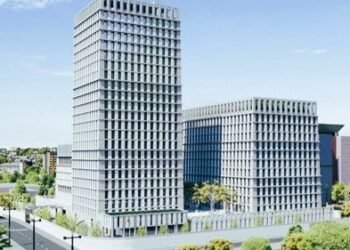The International Monetary Fund (IMF) has shed light on Africa’s imminent demographic transition, projecting a doubling of the sub-Saharan population to two billion by 2050.
This surge, primarily fueled by an expanding working-age populace, presents a promising opportunity for economic growth. However, the IMF noted that realizing this potential hinges on substantial investments in education across the region.
In its 2024 regional economic outlook, the IMF highlighted the pivotal role of education in leveraging Africa’s demographic dividend. Despite commendable strides, sub-Saharan Africa still grapples with educational disparities compared to other emerging markets and developing economies.
Shockingly, nearly three in ten school-age children remain out of school, with only a 65 percent completion rate for primary education— a far cry from the global average of 87 percent. Additionally, the literacy rate among 15 to 24-year-olds stands at a modest 75 percent, trailing behind the nearly 90 percent rate observed in other economies.
The COVID-19 pandemic further exacerbated these educational challenges, with widespread school closures leading to significant learning setbacks. In some instances, the progress achieved over years was reversed, highlighting the vulnerability of Africa’s education system to external shocks.
Investing in education is not merely a moral imperative but also an economic necessity. A well-educated workforce is essential for driving innovation, fostering entrepreneurship, and enhancing productivity; all of which are crucial for sustained economic growth. By equipping its youth with the necessary skills and knowledge, Africa can harness the full potential of its burgeoning population to propel socioeconomic development.
Moreover, education serves as a catalyst for achieving broader development goals, including poverty reduction, gender equality, and social cohesion. By prioritizing education, African nations can empower individuals, bridge societal gaps, and create a more inclusive and prosperous future for all citizens.
The IMF’s call for increased investment in education echoes the sentiments of many policymakers and development stakeholders. Governments, in collaboration with international organizations and the private sector, must prioritize education spending, ensuring equitable access to quality education for all, regardless of socio-economic background or geographical location.
Furthermore, efforts to enhance education must extend beyond traditional classroom settings. Embracing innovative technologies and pedagogical approaches can enhance learning outcomes and prepare students for the demands of the 21st-century economy. By leveraging digital platforms, distance learning, and skills development programs, Africa can overcome barriers to education and foster a culture of lifelong learning.
Education Budgets in the Region Strikingly Low
The IMF’s analysis uncovered that government education budgets in the region were strikingly low, with the median expenditure equal to around 3.5 percent of the countries’ gross domestic product (GDP) in 2020.
This falls short of the international benchmark of a minimum of 4 percent of GDP allocated to education, highlighting the substantial shortfall in funding that African countries need to address in order to bolster educational outcomes.
While the poor government spending on education in sub-Saharan Africa has been identified as a critical challenge in the region’s quest to meet the Sustainable Development Goal (SDG) of universal primary and secondary school enrollment by 2030, the IMF’s latest analysis noted that this goal may necessitate a twofold increase in education expenditures as a proportion of GDP, including contributions from both public and private funding sources.
“Greater spending to improve access is important, but equally important is the effort to ensure that funds are efficiently used. Indeed, for the median country in sub-Saharan Africa, only 15 percent of students in primary and secondary school achieve more than the minimum learning outcome, while teacher training rates have fallen steadily for two decades.”
IMF
The IMF’s analysis disclosed further that investing in education represents a strategic long-term economic decision, as the returns on these investments are both substantial and enduring, easily offsetting the initial costs.
Based on the latest Fiscal Monitor, the IMF found that increased government expenditure on education yields numerous economic benefits, including heightened productivity and foreign direct investment inflows.
In response to the pressing need to ramp up education funding in sub-Saharan Africa, while navigating a tight fiscal climate and diminishing resources, the IMF advised governments in the region to safeguard their education budgets and adopt efficient financial management strategies to raise domestic revenue and ensure that the allocated funds are optimally utilized
For their part, donors and international organisations were encouraged to maintain or expand education funding support across the region. This, the IMF stated, will ensure the supply of a productive labor force that will be needed more and more urgently by a rapidly aging world, and help the region become one of the world’s most dynamic sources of new demand for consumption and investment.
On a broader level, the IMF said it is critical to better connect the region’s abundant human resources with the abundant capital in advanced economies and major emerging markets.
The IMF added that given the right kind of policies, especially in education, sub-Saharan Africa could attract long-term flows of investment, technology, and know-how. And, given rapidly evolving technology and the landscape for jobs, this could unlock the full potential of the region’s young people, better equipping them for the future.
READ ALSO: CISA Urges New Counterterrorism Laws to Address Youth Extremism























